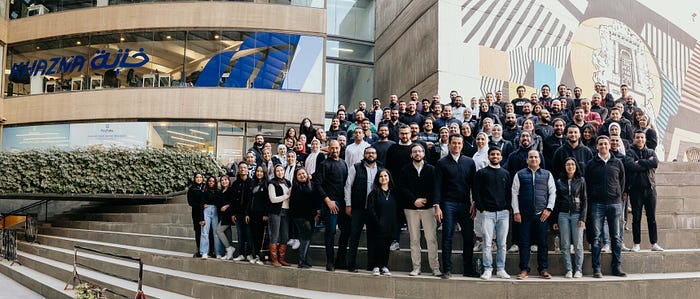
WHY WE INVESTED
How one super app is reinventing financial services across Egypt
For Egyptians traditionally left out of the formal banking system, Khazna provides a suite of services to transform the way they access and manage their money
After earning his MBA at Stanford in 2014, Omar Saleh came back to Cairo where he was born and raised, wanting to build a business that had a positive impact on people’s lives. Not long after he got back, a personal banking experience made him take a closer look at the financial sector. “When I got back to Egypt, I was rejected for a credit card, which got me intrigued by this whole industry,” he says.
Saleh, who studied engineering and worked in the energy sector before business school, spent some time working in the remittances space before co-founding Khazna in 2020. Khazna has since gone on to offer a suite of digital financial services to replace informal cash-driven alternatives that were, for most Egyptians, the only options available.
Across the country, two-thirds of Egyptians are unbanked, with those who are banked having limited access to services beyond a basic ATM card. Historically in Egypt, people have relied almost exclusively on cash, most of them living paycheck to paycheck.. One resulting outcome is that most Egyptians must turn to family, friends, and their employers when they need to borrow money for emergencies or sudden unforeseeable expenses, having no formal lending alternative to fall back on.
A new vision for financial services
But financial inclusion is in Egypt’s future. As part of the Sustainable Development Strategy (SDS) — also called Egypt Vision 2030 — launched by the Egyptian government in 2016, an emphasis on building out and strengthening information and communication technology via an initiative called “Digital Egypt,” has made financial inclusion through digitization a top priority for the country. In 2017, with buy-in from the Central Bank of Egypt and other authorities, this momentum helped jumpstart the fintech industry in the country. “Once we started seeing regulations changing, that’s when I knew it was the right time to start the business,” says Saleh.
In 2020, Saleh and his co-founders Ahmed Wagueeh, Fatimah El Shenawy, and Omar Salah saw employer credit as an entry point into financial services. Their initial research on middle-income Egyptians revealed just how reliant people were on borrowing money from their employer for short-term credit — a practice adapted by both formally and informally employed Egyptians. “It’s very common for employers of all shapes and forms to be providing their workforce with short-term credit because there’s no alternative,” says Saleh. “We wanted companies to be able to outsource that to Khazna.”
The co-founders decided that Khazna’s first product should help employers manage the short-term credit they provide to their workers. They proved out their model with a small pilot using one of Saleh’s former employers that quickly expanded on a larger scale. Eighteen months later, the business has grown with incredible speed, offering short term credit services to more than 800,000 formally employed people and millions more who are informally employed. “Now it’s more of a pull than a push where big employers are reaching out to us,” he says.
As the employer credit line product of the business took off, the company paid close attention to the pain points of consumers, trying to figure out the best way to solve for those needs. “We are trying to be as customer-centric as possible,” says Saleh. “We spend a lot of time researching our users and their needs.”
Saleh and his co-founders were well-aware that a huge chunk of the market was made up of informal workers. In 2021, after looking more closely at repayment behavior across these groups and running multiple pilots and analyses, Khazna launched a direct-to-consumer credit line. This new service enables informal gig workers and those working for SMEs to access credit through loans underwritten directly by Khazna, rather than outside employers.
Building out its super app
Khazna has since expanded its offerings to a full suite of digital financial services available via its super app, including earned wage access, buy-now-pay-later (BNPL) services in partnership with some of Egypt’s biggest retailers, direct bill payment services, and a prepaid card directly linked to the Khazna App. Consumers can use the Khazna card at any ATM or point of sale, free of charge. For users, it’s been a saving grace, giving them the convenience of accessing a line of credit on their app or making a purchase without having to pay in full upfront. But perhaps most importantly, says Saleh, it’s helped consumers save face, empowering them to take control of their situation so they don’t have to beg friends, family, and their employer for credit when they need it most. “We are leading the efforts to help middle-income Egyptians transition from a cash existence to a digital existence,” says Saleh. “We are prioritizing our financial products based on what our users need.”
As it did for so many around the world, the onset of the pandemic helped accelerate that digitization for Khazna, as more people needed to quickly find alternatives to traditional in-person services. But responding directly to consumer needs has been an even more crucial component to the company’s ability to grow so quickly. Today Khazna has more than 200 employees, many of them focused on customer support. And with 80 percent of customer tickets coming through WhatsApp alone, the need to stay closely connected to consumers helps keep the company’s momentum going. Khazna has 150,000 active users today, with the goal of reaching one million users by the end of the year, and five million in the coming years.
An obsession with customer needs
Khazna’s team has a weekly “customer obsession call” and brings users into the office every week to solicit continuous feedback. When users wanted more offers to buy on installment, Khazna focused efforts on building out partnerships with the biggest retailers in Egypt to offer BNPL options. The company created the Khazna card as a direct response to consumer feedback that customers wanted access to money instantly, which allows users to access credit immediately and at any time.
The continuous growth of Khazna’s offerings and services is part of a broader vision for financial services. Today, consumers across Egypt who were historically neglected by the formal banking sector have access to a suite of mobile native financial services offered by Khazna. They can instantly access wages and get a credit line, purchase on installment, pay bills digitally, transfer money instantly, and enjoy access to Khazna’s prepaid card.
Khazna is the first financial super app to receive final approval for its prepaid card from Egypt’s regulatory authorities. This approval is in line with Khazna’s determination to build its technology in compliance with the strictest cybersecurity and data protection laws in Egypt, and to work closely with the Central Bank of Egypt to get the product right.
“Demand for the Khazna card has been enormous, with a waiting list of more than 100,000 that we aim to fulfill within the next six months,” says Saleh. The card, which is the first co-branded prepaid card in Egypt linked to a digital service, is the company’s primary area of focus for 2022. “For lots of people, this will be their first prepaid card linked directly to an app with an instant credit line,” says Saleh. “We think it’s going to not only help our current users access instant credit, but also help with the unbanked problem in Egypt.”
And as the company continues to expand its offerings, it also places a premium on building and fostering the strongest possible leadership team. Recognized as one of the top startup employers in Egypt by LinkedIn, Khazna prioritizes transparency and radical meritocracy in a way most companies in Egypt normally would not. “It’s a very open environment,” says Saleh. “We have been trying to push the envelope on inventing new models and products and it has helped us learn a tremendous amount about our user base. The people we’ve assembled to work on Khazna are committed to helping everyone access the financial tools that can improve their lives, and they’re excited about the opportunity to work for a company that prioritizes transparency in communications not only with its users, but among ourselves.”
Quona led the Series A investment into Khazna. Read more in Tech Crunch.
Disclaimer: Quona portfolio companies were selected for profiles based on objective, non-performance-based criteria for the purpose of illustrating the types of investment made by Quona funds and their impacts. These profiles are being provided for illustrative purposes only, in order to provide examples of the idea generation, research, and thought process of Quona investment teams. No representation is made as to whether or if the investment ideas represented in these profiles have been or will be profitable. It should not be assumed that Quona will be able to identify similar investment opportunities in the future, or that any such opportunities will be profitable. The above statements include the opinions of the Firm and are for illustrative purposes only. There is no assurance that any trends depicted or objectives described in Quona profiles will continue or become successful.
